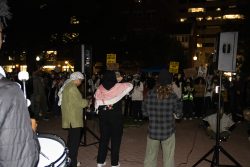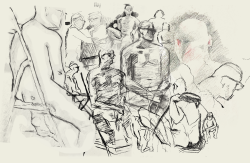Although some successful businesses have recently opened on the street, space on Anacostia’s Martin Luther King Avenue SE doesn’t exude status like a K or M Street address does. It’s in Ward 8, the city’s poorest ward. With 43 homicides in 2009, it is also the city’s most violent. A half-collapsed building rots on the street, which local residents claim has been untouched since a 1968 riot. Elsewhere, the street is spotted with the canker sores of poverty, derelict buildings and check cashing storefronts.
Yet the avenue is home to D.C.’s most successful open-enrollment high school, Thurgood Marshall Academy. This unlikely success story began in a similarly unlikely way: with ten students and a class project at the Georgetown Law Center.
The charter school’s interior reveals its Georgetown roots. A Georgetown pennant hangs next to a classroom entrance, signifying the teacher’s alma mater.
“It makes college more real,” Joshua Kern (LAW ’01), the school’s executive director, said. Kern and nine other law students, along with professors from the Georgetown Law Center, founded Thurgood Marshall in 2000.
College is real for Thurgood Marshall’s students—last year’s seniors were all accepted to college, and 90 percent attended. Ten years since its founding, Thurgood Marshall is one of D.C.’s highest performing public schools, outperforming Anacostia’s two other high schools in reading and math scores by nearly three-to-one.
Kern, in a suit with no tie, looks more Boston Legal than Boston Public. He seems to derive physical pleasure from getting things done. On the phone with a friend, Kern reacts to good news by pounding his fist on a desk and exclaiming, “Yeah, I love progress!”
It was at Ballou, another Anacostia high school, where the idea for Thurgood Marshall was born. Kern was placed there in 1999 to teach law to high school students as part of Street Law, a Law Center program that teaches legal concepts to D.C. public school students. What they saw at Ballou convinced Kern that public education in Anacostia was fundamentally flawed.
“Until you see what’s happening, what’s not happening, you really just don’t understand how bad [inner-city schooling] really is,” Kern said.
Metal detectors and incessant PA announcements beat down Ballou students’ enthusiasm for learning. Just as damaging was the way teachers and administrators treated the students.
“There wasn’t really the expectation that the kids were going to learn,” he said.
Disheartened by what he experienced at Ballou, Kern, along with Lee McGoldrick (LAW ’99), an adjunct professor at the Law Center, approached then-Law Center Dean Judith Areen at the end of the semester. They wanted to create a student-initiated seminar, a rare type of Law Center class, on public education. Areen was skeptical and told them she would only approve the class if they could prepare a syllabus by the beginning of the next semester.
”I think she felt like it was the beginning of break and these kids aren’t going to do it,” Kern said.
To Areen’s surprise, McGoldrick and Kern did prepare a syllabus, and soon began picking the law students who would join them. Street Law professor Richard Roe and McGoldrick became the class’s advisors.
The students spent the next semester figuring out how they could improve public education in D.C. After considering starting an afterschool program within the D.C. Public School system, Kern and his classmates decided to create a charter school in Anacostia.
“We wanted a truly college preparatory school in an area of the city that didn’t have one,” Kern said. “Why should kids who want that have to go all the way across the city?”
When deciding what to name the school, almost all of the students in the Law Center class chose to name it after Justice Thurgood Marshall, the first African-American Supreme Court Justice and a lawyer in the landmark Brown v. Board of Education case.
Like Dean Areen, D.C.’s Public Charter School Board took a chance on the law students, approving Thurgood Marshall’s charter in August of 2000. That left Kern and his classmates only one year to find a building and students for their new school, all while working on their law degrees.
“Law school became my second priority,” Kern said.
Thomas Hutton (LAW ‘00), a member of the law Center class who had already graduated by the time Thurgood Marshall received a charter, scoured the area for a location for the school.
“Where are we going to house this thing?” Hutton recalled wondering. “I can remember driving around Ward 8, block by block.”
Eventually the school found room in a church’s annex building.
In order to get students for their charter, however, the law students had to grapple with a more difficult problem than limited real estate: winning the trust of a neighborhood that had been burned by outsiders before.
More than the Anacostia River separates Ward 8 from the rest of Washington. Decades of neglect by the District government have left Anacostia impoverished, with a 28 percent unemployment rate in 2009, according to the Washington Post.
Ward 8’s disdain for outsiders is best personified by its councilman, former mayor Marion Barry (D). Barry is perhaps best known for saying “bitch set me up” on a surveillance tape, right after being arrested for smoking crack cocaine during an FBI sting operation.
Despite earning a misdemeanor drug conviction in the ensuing trial, he returned from jail for another term as mayor. In 2008, he won the ward’s Democratic primary with 77.5 percent of the votes cast. The ward’s willingness to elect a recovering drug addict who continues to be linked to patronage scandals can seem incomprehensible to outsiders, including other Washingtonians. But many in Anacostia value Barry’s ability to stand up for the marginalized ward in local government.
“There was a lot of distrust when we opened this school,” Kern said. “It was from decades of false promises.”
As a primarily white group, the law students were out of place in Anacostia, a predominantly African-American neighborhood. But Thurgood Marshall’s founders discovered that a legacy of distrust was a bigger obstacle than racial differences.
In one awkward attempt to win neighborhood support and gain students for Thurgood Marshall, Hutton crashed a meeting of a Ward 8 activist groups.
“Walking down there in my little suit and saying ‘Hey, we’re interested in starting a charter school here and we want to talk about it,’” he said. “It was sort of a clumsy attempt to reach out to a whole bunch of people at once.”
Thurgood Marshall’s founders also had trouble convincing parents and students to take a chance on a smaller school that didn’t offer the benefits of much larger neighborhood schools, Anacostia High School and Ballou.
“You’re never going to have a football team, you’re never going to have a band,” Joe Feldman, the school’s first principal, said.
The law students managed to convince parents to trust them with their children through leaflets, community meetings, and introductions at Metro stations. By the start of the school’s first class in the fall of 2001, Thurgood Marshall had 80 students.
Kern attributes the school’s initial enrollment not to the school’s reputation, but to the failure of other Anacostia high schools.
“There was a level of dissatisfaction that existed with the current options,” Kern said.
By the end of its first year, though, the school was still not rooted in the community its founders wanted to serve. The church’s leaders refused to renew the school’s lease or give it more room to expand, and the space they did have flooded.
“Every time it rained, I would have to mop up the basement,” Feldman said. “I was the highest-paid janitor you’ve ever seen.”
School space across the Anacostia River in Ward 6 beckoned. Since leaving Anacostia would mean no longer being a college preparatory school for the neighborhood, Kern turned to D.C. Council Chair Vincent Gray (D), then the director of a charity for homeless teenagers based in Ward 8, for advice.
“So many organizations come into Ward 8 promising to do great things,” Kern said Gray told him. “Ward 8 is like a city unto itself. Things get hard, and they leave.”
Gray told him to try to stay in the community, even if problems finding space meant closing Thurgood Marshall. Eventually, the church leadership allowed the school to renew its lease.
Gray did not respond to a request for comment.
After spending $12 million on rehabilitating a disused elementary school, Thurgood Marshall moved into its new building on Martin Luther King in October 2005, leaving space issues behind The new building allowed the school to expand to its current enrollment of 391 students.
The school’s origins as a Law Center class are visible in its curriculum, which frequently incorporates the law in courses. Thurgood Marshall employs a retired lawyer who works with teachers to weave legal concepts into their classes.
“We want to give them some basic legal concepts and the skills that lawyers traditionally have,” Kern said. According to Kern, the school was founded to prepare students both for college and for participation in American democracy.
This focus on the law is on display in the school’s mentoring program. One Saturday a month, students meet with mentors from the D.C. area, many of whom are lawyers.
School meetings on Saturday are just one aspect of Thurgood Marshall’s academic rigor. Even more significant is the school’s refusal to advance a student to the next grade if the school doesn’t think they’re ready.
“We have kids who were straight-A students in junior high school, at a DCPS junior high school, who come here and get an F,” Kern said. “It’s hard for kids to understand why they got an F.”
Kern thinks that by the end of ninth grade students understand that they need to work hard at school.
This rigor is reflected in the school’s test scores. In 2009, 72 percent of Thurgood Marshall’s students scored proficient or higher on the math portion of the D.C. Comprehensive Assessment System, the test used to evaluate Washington students. This score, along with a 67 percent proficient rating on the test’s reading portion, makes Thurgood Marshall not just the best scoring open-enrollment high school in Anacostia, but one of the best public schools in the city.
The school’s success is even more impressive considering Anacostia’s high rate of adult illiteracy, according to Barnaby Towns, the Director of Communications at FOCUS DC, an organization that promotes charter schools in the District. Towns credits Thurgood Marshall with innovative use of tracking that catches students who are falling behind.
“They’ve been among the pioneers,” Towns said.
While Hutton is impressed with the progress made at Thurgood Marshall, he hopes the school will create change throughout the DC public school system. Still, he understands the concerns from charter school opponents about law students with little teaching experience operating schools.
“That’s one of the things that people will debate,” Hutton said. “Do you want to turn over the education of children to dilettantes who don’t have the track record?”
Opponents criticize charter schools for lacking the oversight of traditional public schools, attributing comparatively higher test scores to the idea that only the most motivated students would attend a charter school.
The school’s community problems in Anacostia have eased considerably since its founding. Nothing symbolizes Thurgood Marshall’s acceptance in Ward 8 like the support it now receives from Barry, its iconic councilman. Barry attended the openings of the new school building and the dedication of a new gym in 2009, and Kern takes a break from work to eat lunch with him.
Although most of Thurgood Marshall’s founders no longer work there, McGoldrick, the professor who advised the class, said she’s proud of the work she and her law students did.
“What I saw was the uniquely right group of people and the uniquely right moment in time,” McGoldrick said.





Nicely done. We are all quite pround of Thurgood Marshall Academy PCS. This article gives the most complete historical perspective I’ve seen in journalism yet. Great job Mr. Sommer.
Thanks for mentioning our great library at TMA. As a Georgetown alum and the librarian at TMA, I can say that it certainly has Lauinger beat.
As the parent of a TMA student, I think the best is yet to come for this school. The students are required to present a portfolio of their semester grades! The emphasis on hard work and discipline can be be seen throughout the school. Very well written article.
My daughter is a TMA Senior. Coming from a great private school on The Hill, she took this public charter school for granted. The curriculum was certainly in step if not beyond expectations of her previous school. What partly blocked her motivation to do her absolute best was the element surrounding her commute to and fro. And partly (though absolutely no excuse) the lack of diversity. Regardless, I’m a walking billboard for TMA. Recruiting ‘others’ across the city to check it out.
Michael Hendricks (Col ’06) brought his class to my Church and the Poor class and Prof. Bob Bies’ class in MSB this past fall. Chris Wright, Monica McNutt and Coach Flournoy gave them a great tour and the Black House had them for lunch. Hendo is the man! TMA is very cool.
fr. ray k